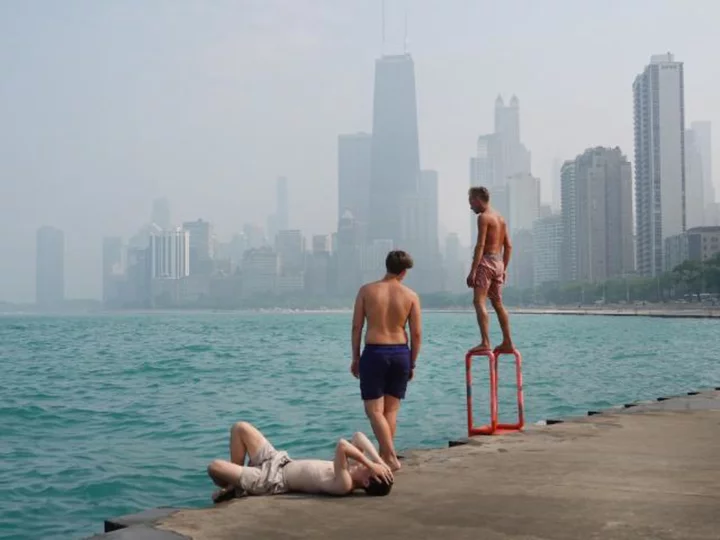Dangerous air quality and hazy skies persist from Toronto to Washington, DC, as smoke from Canada's raging wildfires drifts south — with more than 120 million under air quality alerts within the US.
Chicago and Detroit had the worst air quality in the world as of Wednesday night, according to IQAir, while Cleveland, Detroit, Washington DC, and Minneapolis all ranked among the top 10 most polluted cities in the world.
In Canada -- which is seeing its worst fire season on record -- many cities recorded unhealthy quality index readings, including Toronto.
A Code Red alert -- warning of unhealthy air quality -- was issued for much of the Midwest and Ohio Valley on Wednesday, according to AirNow.gov. Other affected American cities were mostly under "Code Orange" -- with the air deemed unhealthy for sensitive groups.
Several cities across Wisconsin, Pennsylvania and Iowa were experiencing "very unhealthy" air that poses health risks for everyone -- not just sensitive groups, according to AirNow.gov.
Smoke was so thick, it reduced visibility for up to three miles in some areas across the Great Lakes and Ohio Valley.
On Thursday, those areas are expected to experience the worst air quality in the country -- with the highest risk of reaching "Unhealthy" and "Very Unhealthy" levels -- early in the day before before the smoke begins to slowly disperse.
Farther east, including in New York, residents will likely be under an Code Orange, or "Unhealthy for sensitive groups," air quality warning.
Residents are being advised to stay indoors with their air conditioning running, avoid going outside, and in some areas, wear N95 masks if they have to be outside.
Meanwhile, from Minnesota to Pennsylvania, events are being canceled due to the wildfire smoke.
Clouds of smoke are pouring in across the border as hundreds of blazes are burning simultaneously across Canada
"With no end in sight to the Canadian wildfires and west to northwesterly winds expected to persist from south central Canada into the north central to northeast U.S., poor air quality conditions are likely to continue," the National Weather Service warned.
Photos from across the country captured the eerie hazy or orange skies over iconic American skylines, with smoke lingering over freeways and neighborhoods.
Authorities in New York were distributing N95 masks at transit hubs and parks. New York Gov. Kathy Hochul expanded an air quality health advisory in New York to include the entire state on Wednesday.
Wildfire smoke carries particulate matter, or PM2.5 -- a tiny but dangerous pollutant that, when inhaled, can travel deep into lung tissue and enter the bloodstream, according to the US Centers for Disease Control and Prevention. The particulate matter has been linked to a number of health problems including asthma, heart disease and other respiratory illnesses.
With the Air Quality Index higher than 150 and considered "unhealthy" in many cities, residents are being advised to avoid strenuous outdoor activities. Those in vulnerable groups should avoid exposure to the outdoors -- especially if pregnant, New York health officials said.
People with heart or breathing problems, children and older people may be particularly sensitive to PM 2.5.
Exposure can cause short-term health effects like irritation to the eyes, nose, and throat, coughing, sneezing, runny nose, and shortness of breath. Exposure to high levels of fine particulate matter can also worsen medical conditions such as asthma and heart disease, New York health officials said.
How to limit exposure
As smoke inundate cities, health departments across the country have been advising residents to limit their exposure to the pollutants. Many are calling for people to stay indoors and avoid activities that make them breathe faster or more deeply.
"The recommendation is to close your windows, turn on the air conditioners, turn on air filters," Dr. Aida Capo, a pulmonologist with Hackensack Meridian Palisades Medical Center in New Jersey, told CNN.
Since particles can creep into homes, AirNow recommends that those in areas with high levels of particle pollution consider purchasing an air cleaner.
For those who have to be outside, disposable respirators like N-95s or P-100s will help if worn correctly, AirNow says. Meanwhile, surgical masks, paper dust masks, scarves and bandanas won't protect the lungs from PM2.5.
Residents in affected areas are also advised to reduce strenuous physical activity.
"If you have to walk, walk, but I wouldn't go for a run or a jog," said Dr. Shilpa Patel, medical director of Children's National IMPACT DC Asthma Clinic in Washington.
"Just be prudent about your decision to be outside," she added. "And keep in mind, even if you go outside and it doesn't bother you, it could affect you later. Because these are small particulates, so they go deep into your airways, and the response could be a little bit delayed."

